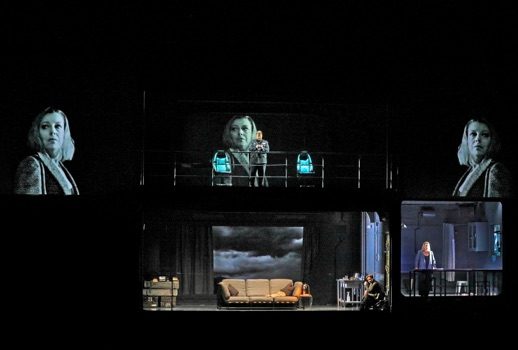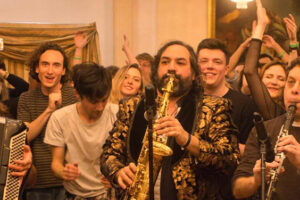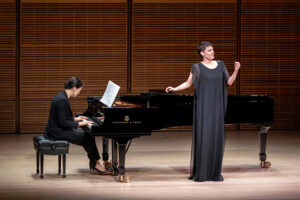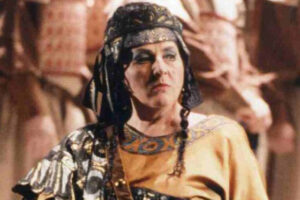

Indeed, gloomy might be an altogether ineffectual word to describe Treli?ski’s oppressive vision for the Arthurian romance of forbidden love between a nobleman and an Irish princess. Set in what appears to be a dystopia of the not-too-distant future, oppressive may serve as the better adjective. How else to describe the manner in which Trelinski overwhelmed his tableaus with a confounding lack of light? Darkness is a major aspect of the opera’s erotic dynamics, but Trelinski drove this point to the brink, cloaking the set in perpetual shadow, at times even hiding the singers from view.
While Wagner’s libretto references darkness as the purview of desire, transcendence, and unity, his philosophical framework also gives ample attention to the light—a piercing beam that reveals the phenomenological world, illuminating and undermining desire’s illusory disintegration of boundaries. However, for Wagner’s ideas to work, one needs to be able to comprehend the stark contrast between darkness and light, a point that Trelinski failed to register on the stage. Instead, his intervention was heavy-handed twilight, and not much else.
What exacerbated this problem was the use of a scrim for the entire evening, upon which the director thrust the production’s sole visual accent—a series of enigmatic and irritating projections: images of what appeared to be, among other things, a sonar screen, a sea captain, a child, a boat wobbling amid crashing waves, and a large black orb (perhaps an image of eclipse? I’m not sure).
These choices felt vague, if not downright erratic; and additionally, Trelinski seemed to toy with an obscure backstory—a pretentious gesture that tended to over-determine the text toward ambiguousness, rather than breathe new life into it.
Fortunately, Sir Simon Rattle led an expert Met orchestra; and while the evening failed to work dramatically, there was much to recommend it musically. To begin with, Nina Stemme’s Isolde was a force to be reckoned with—lyrically warm vocalism, with a core of steel. Despite a few unfortunate wobbly phrases, her searing soprano was an exercise in stamina. And, her characterization of Isolde managed to be, despite Treli?ski’s production, multi-dimensional and nuanced.
Moreover, Ekaterina Gubanova’s mezzo-soprano served an especially luxurious Brangäne, Isolde’s maid and confidant. This was most wonderfully evident during the second act, in which her solid, well-produced voice rose up above Wagner’s strings, calling out in warning to the two lovers.
Another highlight was the stalwart René Pape as King Marke. Pape was, as ever, a reliable presence, arriving in the second act with a secure, sonorous bass, exuding a steady gravitas. And as Kurenwal, Evgeny Nikitin’s bass-baritone was a memorable contribution as well, especially during the third act in which he tried to comfort Tristan, who was writhing in delirium.
The only drawback, musically, was the singing of Stuart Skelton as Tristan, whose round voice sounded more like a baritone with an extension, than a true heldentenor. He started off well enough in the first act; but unfortunately, he began to fall apart during the second. And his vocal difficulties became even more pronounced and unnerving during the third act, a point in which the opera relies most heavily on Tristan’s ability to command the stage.
As Porgy Amor wrote on Parterre last week, the last time Tristan und Isolde opened a season at the Met was in 1937, with Flagstad and Melchior in the title roles. A long time ago. And, I have to admit that when I heard the company was launching its 2016-17 season with a new Tristan und Isolde, I was a little confused. It seemed to me an odd choice for an opening night—long, serious, and potentially ponderous—and indeed, the glitzy audience seemed at odds with the crepuscular, anxious goings-on onstage. They had turned out for a party, and instead were treated to a sermon.
The question that seemed to surface for me was this: why Tristan for a season opener? Tristan und Isolde is an opera structured on the premise of waiting. We wait the duration of the opera, beginning with that infamous chord, for a resolution. Unending suspension—all tension and no release. Such subjectivity bodes well for an opera about erotic love, which hinges on the thin line between a limit and transcendence.
And as I mentioned above, it’s also an opera about light and darkness, about the boundaries that fall away when there’s nothing to illuminate the edge of things: bodies, oceans, and lifespans. Difference, and the way that desire subverts alterity, makes the other—the stranger—suddenly belong to the self (a part of the self?), releasing identity.
Such intoxicating notions, rooted in Wagner’s fascination with Schopenhauer, can potentially engender states of ecstatic and glorious suffering, glamorous and heroic—the stuff of opening nights and season premiers. Perhaps if Trelinski had managed a production as fascinating as the opera’s themes, the programming would have made more sense. But these modes were passed over last night for an essay in bleak arbitrariness. It was very disappointing, despite the excellent musicians, all of whom worked very hard.
It was not the opening night I had hoped for, despite its best efforts and excellent singing. All gloom—a total downer. Here’s hoping the season brightens up a bit, perhaps just enough so that we may at least see the performers on the stage.
Photo: Ken Howard























Comments